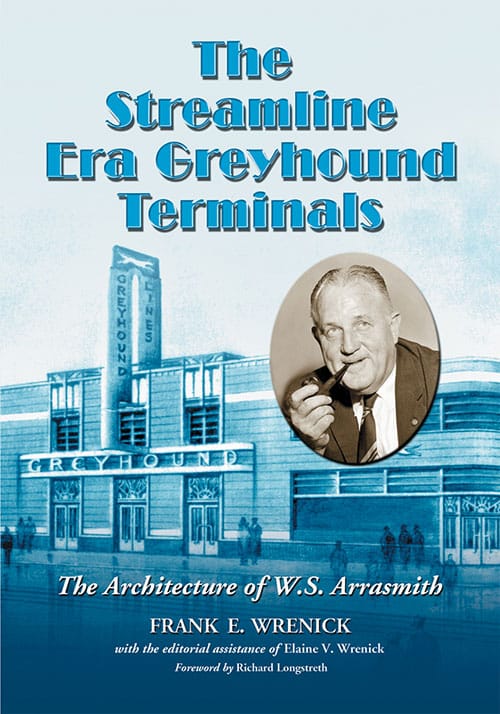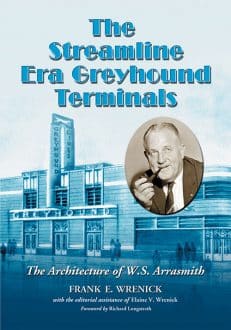The Streamline Era Greyhound Terminals
The Architecture of W.S. Arrasmith
$35.00
In stock
About the Book
In post–Depression America, Greyhound put adventure within the reach of all. Convinced that their terminals should project the glamour and excitement of travel, the company turned to an architect who could translate the sleek, streamlined Greyhound design into buildings that would both serve and delight the public.
This volume explores the life of William Strudwick Arrasmith, a defining artist of the short-lived era of streamline design, and especially his work for Greyhound—at least fifty terminals and other facilities. The final third of the book is a detailed examination of 28 of these terminals. A full chronology of Arrasmith’s firms and commissions is also included.
About the Author(s)
Bibliographic Details
Frank E. Wrenick with the editorial assistance of Elaine V. Wrenick
Foreword by Richard Longstreth
Format: softcover (7 x 10)
Pages: 204
Bibliographic Info: 79 photos, chronology, notes, bibliography, index
Copyright Date: 2011 [2007]
pISBN: 978-0-7864-6445-6
Imprint: McFarland
Table of Contents
Acknowledgments vii
Foreword by Richard Longstreth 1
Preface 5
Introduction 7
PART I: W. S. ARRASMITH, 1898–1965
1. The Early Years 11
2. Wischmeyer & Arrasmith Forms in Louisville 20
3. Wischmeyer & Arrasmith During the Depression 29
4. Fred Elswick Joins the Firm 41
5. Greyhound Enters the Picture 49
6. Arrasmith’s Service in World War II 59
7. Greyhound’s Architect in the East: The Move to Cleveland 64
8. The Cleveland and Akron Terminals 75
9. Arrasmith Returns to Louisville 81
10. The Greyhound Work Ends 89
PART II: THE STREAMLINE ERA OF GREYHOUND BUS TERMINAL DESIGN
11. A Short History of the Greyhound Bus Company 99
12. The Evolution and Design of Bus Terminals 101
History 101
Design 104
13. Streamline Styling, 1937 to 1948 109
The Greyhound Super Coach 112
The Silversides Greyhound Bus 115
14. Greyhound’s Transition to an Avant-Garde Style 117
15. The Grand Opening 120
PART III: THE GREYHOUND TERMINALS OF W.S. ARRASMITH
A Chronological Survey
1937 Louisville, Kentucky 125
1937 Bowling Green, Kentucky 128
1938 Jackson, Mississippi 129
1938 Fort Wayne, Indiana 130
1938 Binghamton, New York 131
1939 Evansville, Indiana 133
1940 Washington, D.C. 136
1940 Erie, Pennsylvania 140
1940 Columbus, Ohio 141
1940 Dayton, Ohio 143
1940 Atlanta, Georgia 144
1941 Syracuse, New York 146
1941 Buffalo, New York 147
1941 Cincinnati, Ohio 148
1942 Norfolk, Virginia 149
1942 Baltimore, Maryland 149
1942 Chicago, Illinois (Proposed) 151
1946 Hagerstown, Maryland (Proposed) 153
1948 Cleveland, Ohio 153
1949 Akron, Ohio 158
1949 Battle Creek, Michigan 160
1949 Grand Rapids, Michigan 161
1949 Lima, Ohio 162
1950 Lansing, Michigan 163
1950 Boston, Massachusetts 164
1951 Birmingham, Alabama 166
1954 St. Paul, Minnesota 167
1959 Pittsburgh, Pennsylvania 167
Chronology of W.S. Arrasmith Architectural Firms and Commissions 171
Chapter Notes 177
Sources 183
Photograph and Image Credits 189
Index 193
Book Reviews & Awards
- “One of the few comprehensive sources of information on the subject…get the book. It’s good.”—The Beauty of Transport
- “The magnitude of…research…is impressive…a definitive academic reference work…belongs in every architectural…and…transportation history library”—Society for Commercial Archeology Journal
- “Valuable…finely detailed social history…intimate…charming…personalized”—The Journal of American Culture
- “Extensive chronology, notes, sources and index are impressively detailed. A fitting tribute to a little-known man behind an instantly recognizable icon of American transportation”—Hemmings Motor News





